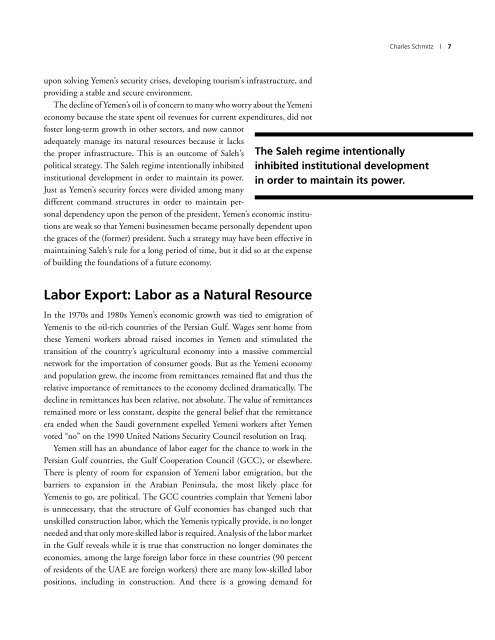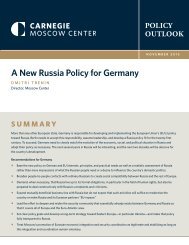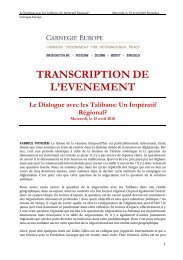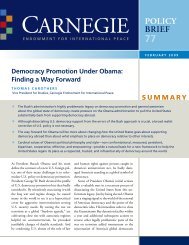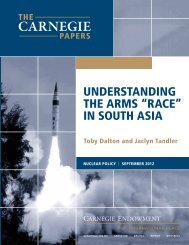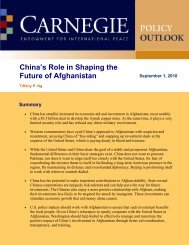building a better yemen - Carnegie Endowment for International Peace
building a better yemen - Carnegie Endowment for International Peace
building a better yemen - Carnegie Endowment for International Peace
You also want an ePaper? Increase the reach of your titles
YUMPU automatically turns print PDFs into web optimized ePapers that Google loves.
Charles Schmitz | 7<br />
upon solving Yemen’s security crises, developing tourism’s infrastructure, and<br />
providing a stable and secure environment.<br />
The decline of Yemen’s oil is of concern to many who worry about the Yemeni<br />
economy because the state spent oil revenues <strong>for</strong> current expenditures, did not<br />
foster long-term growth in other sectors, and now cannot<br />
adequately manage its natural resources because it lacks<br />
the proper infrastructure. This is an outcome of Saleh’s The Saleh regime intentionally<br />
political strategy. The Saleh regime intentionally inhibited inhibited institutional development<br />
institutional development in order to maintain its power. in order to maintain its power.<br />
Just as Yemen’s security <strong>for</strong>ces were divided among many<br />
different command structures in order to maintain personal<br />
dependency upon the person of the president, Yemen’s economic institutions<br />
are weak so that Yemeni businessmen became personally dependent upon<br />
the graces of the (<strong>for</strong>mer) president. Such a strategy may have been effective in<br />
maintaining Saleh’s rule <strong>for</strong> a long period of time, but it did so at the expense<br />
of <strong>building</strong> the foundations of a future economy.<br />
Labor Export: Labor as a Natural Resource<br />
In the 1970s and 1980s Yemen’s economic growth was tied to emigration of<br />
Yemenis to the oil-rich countries of the Persian Gulf. Wages sent home from<br />
these Yemeni workers abroad raised incomes in Yemen and stimulated the<br />
transition of the country’s agricultural economy into a massive commercial<br />
network <strong>for</strong> the importation of consumer goods. But as the Yemeni economy<br />
and population grew, the income from remittances remained flat and thus the<br />
relative importance of remittances to the economy declined dramatically. The<br />
decline in remittances has been relative, not absolute. The value of remittances<br />
remained more or less constant, despite the general belief that the remittance<br />
era ended when the Saudi government expelled Yemeni workers after Yemen<br />
voted “no” on the 1990 United Nations Security Council resolution on Iraq.<br />
Yemen still has an abundance of labor eager <strong>for</strong> the chance to work in the<br />
Persian Gulf countries, the Gulf Cooperation Council (GCC), or elsewhere.<br />
There is plenty of room <strong>for</strong> expansion of Yemeni labor emigration, but the<br />
barriers to expansion in the Arabian Peninsula, the most likely place <strong>for</strong><br />
Yemenis to go, are political. The GCC countries complain that Yemeni labor<br />
is unnecessary, that the structure of Gulf economies has changed such that<br />
unskilled construction labor, which the Yemenis typically provide, is no longer<br />
needed and that only more skilled labor is required. Analysis of the labor market<br />
in the Gulf reveals while it is true that construction no longer dominates the<br />
economies, among the large <strong>for</strong>eign labor <strong>for</strong>ce in these countries (90 percent<br />
of residents of the UAE are <strong>for</strong>eign workers) there are many low-skilled labor<br />
positions, including in construction. And there is a growing demand <strong>for</strong>


